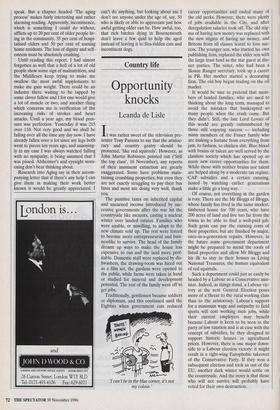Country life
Opportunity knocks
Leanda de Lisle
It was rather sweet of the television pre- senter Tony Parsons to say that the aristoc- racy and country gentry should be protected, 'like red squirrels'. However, as John Martin Robinson pointed out ('Still the top class', 16 November), any reports of their imminent extinction are greatly exaggerated. Some have problems main- taining crumbling properties, but even they are not exactly struggling to pay their bus fares and most are doing very well, thank you.
The punitive taxes on inherited capital and unearned income introduced by suc- cessive governments after the war hit the countryside like meteors, casting a nuclear winter over landed estates. Families who were unable, or unwilling, to adapt to the new climate sold up. The rest were forced to become more entrepreneurial and busi- nesslike to survive. The head of the family dreamt up ways to make the house less expensive to run and the land more prof- itable. Domestic staff were replaced by dis- hwashers, the drawing-room was hired out as a film set, the gardens were opened to the public, while farms were taken in hand or studied for mineral and development potential. The rest of the family went off to get jobs.
Traditionally, gentlemen became soldiers or diplomats, and this continued until the Eighties when government cuts reduced can't be in the blue comer, it's not my colour.' career opportunities and ended many of the old perks. However, there were plenty of jobs available in the City, and after deregulation salaries took off. The old stig- ma of having new money was replaced with the new stigma of having no money, and Britons from all classes learnt to love suc- cess. The younger son, who started his own publishing firm, replaced the elder son with the large trust fund as the star guest at din- ner parties. The sister, who had been a Sloane Ranger secretary, took up a career in PR. Her mother started a decorating firm. The old boy began trading on the oil market.
It would be nice to pretend that mem- bers of landed families, who are used to thinking about the long term, managed to avoid the mistakes that bankrupted so many people when the crash came. But they didn't. Still, the late Lord Lovats of this world are greatly outnumbered by those still enjoying success — including many members of the Fraser family who are making a fortune from everything from jam, to fashion, to chicken shit. Blue blood with brains or talent are well served by the classless society which has opened up so many new career opportunities for them. While those with neither brains nor talent are helped along by a moderate tax regime, "CAP subsidies and a certain cunning, honed by watching earlier generations make a little go a long way.
Of course, not everything in the garden is rosy. There are the Mr Bloggs of Bloggs, whose family has lived in the same modest, timbered house for 700 years, who have 200 acres of land and live too far from the towns to be able to find a well-paid job. Such gents can pay the running costs of their properties, but are finished by major, once-in-a-generation repairs. However, in the future some government department might be prepared to mend the roofs of listed properties and allow Mr Bloggs and his ilk to stay in their houses as Living National Treasures, the human equivalent of red squirrels.
Such a department could just as easily be headed by a Labour as a Conservative min- ister. Indeed, as things stand, a Labour vic- tory at the next General Election poses more of a threat to the rural working class than to the aristocracy. Labour's support for a minimum wage and antipathy to field sports will cost working men jobs, while their current employers may benefit because Labour is keen to be seen as the party of low taxation and is at ease with the concept of subsidies, be they designed to support historic houses or agricultural prices. However, there is one major down- side to a Labour election victory: it might result in a right-wing Europhobic takeover of the Conservative Party. If they won a subsequent election and took us out of the EU, another dark winter would settle on the countryside. And the irony is that those who will not survive will probably have voted for their own destruction.


















































































 Previous page
Previous page